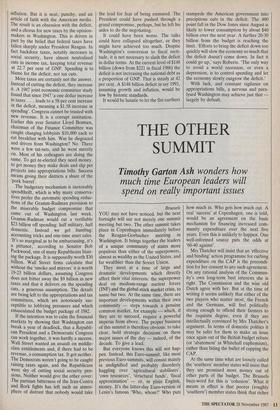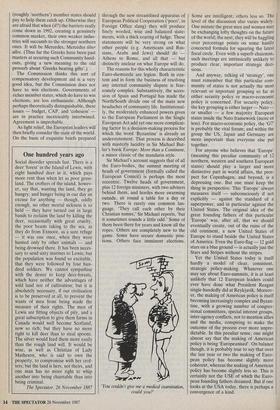THE OTHER SUMMIT
Timothy Garton Ash wonders how much time European leaders will spend on really important issues
Brussels YOU may not have noticed, but the next fortnight will see not merely one summit meeting but two. The other summit takes place in Copenhagen immediately before the Reagan-Gorbachev meeting in Washington. It brings together the leaders of a unique community of states more populous than either of the superpowers, almost as wealthy as the United States, and far wealthier than the Soviet Union.
They meet at a time of large and dramatic developments which directly affect their vital interests: the superpower deal on medium-range nuclear forces (INF) and the global stock market crisis, to name but two. At the same time, there are important developments within their own community — steps towards a genuine common market, for example — which, if they are to succeed, require a powerful impetus from above. The proper business of this summit is therefore obvious: to take clear, bold strategic decisions on these major issues of the day — indeed, of the decade. To give a lead.
But everyone knows this will not hap- pen. Instead, this Euro-summit, like most previous Euro-summits, will consist mainly in undignified and probably disorderly haggling over 'agricultural stabilisers', 'own resources', 'structural funds', 'fiscal approximation' — or, in plain English, money. It's the latter-day Euro-version of Lenin's famous 'Who, whom?' Who puts how much in. Who gets how much out. A real 'success' at Copenhagen, one is told, would be an agreement on the basic mechanism for financing increased com- munity expenditure over the next five years. Even this is unlikely to happen. One well-informed source puts the odds at '60-40 against'.
Mrs Thatcher will insist that an 'effective and binding' action programme for curbing expenditure on the CAP is the precondi- tion for her consent to any such agreement. On any rational analysis of the Commun- ity's own long-term best interests she is right. The Commission and the wise old Dutch agree with her. But at the time of writing it seems unlikely that either of the two players who matter most, the French and the Germans, will feel politically strong enough to offend their farmers to the requisite degree, even if they are intellectually convinced by Mrs Thatcher's argument. In terms of domestic politics it may be safer for them to make an issue once again out of the British budget rebate (or 'abatement' in Whitehall euphemism), rather than biting the bullet of capping the CAP.
At the same time what are loosely called the 'southern' member states will insist that they are promised more money out of other parts of the budget. The Brussels buzz-word for this is 'cohesion'. What it means in effect is that poorer (roughly 'southern') member states think that richer (roughly 'northern') member states should pay to help them catch up. Otherwise they are afraid that when (if?) the barriers really come down in 1992, creating a genuinely common market, their own weaker indus- tries will succumb to the stronger northern ones. It will be Mercedes, Mercedes iiber alles. (Thus far the Greeks have been past masters at securing such Community hand- outs, giving a new meaning to the old proverb about 'Greeks bearing gifts'.) The Commission thinks this sort of compensatory development aid is a very good idea, but the Commission does not have to win elections. Governments of richer member states, which do have to win elections, are less enthusiastic. Although perhaps theoretically distinguishable, these issues — budget, CAP, and 'cohesion' — are in practice inextricably intertwined. Agreement is improbable.
As light relief, the European leaders will then briefly consider the state of the world. On the basis of exquisite briefs prepared through the new streamlined apparatus of European Political Cooperation ('poco', in Foreign Office slang) they will produce finely worded, wise and balanced state- ments, with a thick coating of fudge. These statements will be very strong on what other people (e.g. Americans and Rus- sians, Arabs and Jews) should do — Athens to Rome, and all that — but distinctly unclear on what Europe will do.
The reasons for this wholly characteristic Euro-shemozzle are legion. Both in con- tent and in form the business of resolving any internal community dispute is fear- somely complex. Substantively, the acces- sion of Spain and Portugal has made the North/South divide one of the main new headaches of community life. Institutional- ly, the moderately enhanced powers given to the European Parliament in the Single European Act add yet one more complicat- ing factor to a decision-making process for which the word 'Byzantine' is already an understatement. That process is described with masterly lucidity in Sir Michael But- ler's book Europe: More than a Continent, a minor classic of the mandarin style.
Sir Michael's account suggests that of all the Euro-bodies, the summit meeting of heads of government (formally called the European Council) is perhaps the most eccentric. Twelve heads of government, plus 12 foreign ministers, with two advisers behind them, and hordes More swarming outside, sit round a table for a day or two. There is rarely one common lan- guage. 'They call each other by their Christian names,' Sir Michael reports, 'but it sometimes sounds a little odd.' Some of them been there for years and know all the ropes. Others are completely new to the game. Some have secure domestic posi- tions. Others face imminent elections.
'You couldn't give me a medical examination, could you?' Some are intelligent; others less so. The level of the discussion also varies widely. One minute the great men and women may be exchanging lofty thoughts on the future of the world; the next, they will be haggling over percentage points on some hastily concocted formula for squaring the latest fiscal circle. Even with a superb chairman, such meetings are intrinsically unlikely to produce clear, important strategic deci- sions.
And anyway, talking of 'strategy', one must remember that this particular com- munity of states is not actually the most relevant or important grouping so far as either security policy or macro-economic policy is concerned. For security policy, the key grouping is either larger — Nato — or smaller — a few majority European states inside the Nato framework (more or less). For macro-economic policy, the `G7' is probably the vital forum; and within the group the US, Japan and Germany are more important than everyone else put together.
For anyone who believes that 'Europe' (meaning this peculiar community of 12 northern, western and southern European states) should play a larger and more distinctive part in world affairs, the pros- pect for Copenhagen, and beyond, is a depressing one. But one must keep the thing in perspective. This 'Europe' always measures itself — subconsciously if not explicitly — against the standard of a superpower, and in particular against the United States. The original idea of the great founding fathers of this particular 'Europe' was, after all, that we should eventually create, out of the ruins of the old continent, a new United States of Europe to stand beside the United States of America. Even the Euro-flag — 12 gold stars on a blue ground — is actually just the Stars and Stripes without the stripes.
Yet the United States today is itself hardly a model of clear, consistent, strategic policy-making. Whatever one may say about Euro-summits, it is at least unlikely that 12 European leaders could ever have done what President Reagan single-handedly did at Reykjavik. Moreov- er, the making of American policy is itself becoming increasingly complex and Byzan- tine, with a growing number of congres- sional committees, special interest groups, inter-agency conflicts, not to mention allies and the media, conspiring to make the outcome of the process ever more unpre- dictable. In this peculiar sense, one might almost say that the making of American policy is being 'Europeanised'. On balance though, it is probably true to say that over the last year or two the making of Euro- pean policy has become slightly more coherent, whereas the making of American policy has become slightly less so. This is certainly not the USE of which the Euro- pean founding fathers dreamed. But if one looks at the USA today, there is perhaps a convergence of a kind.



































































 Previous page
Previous page